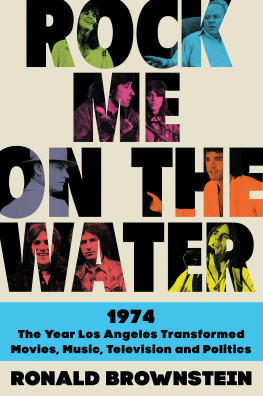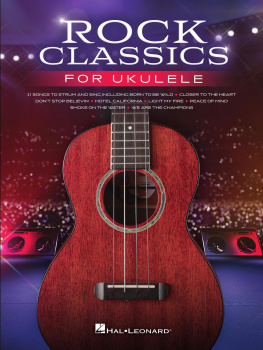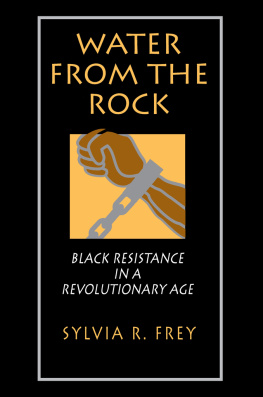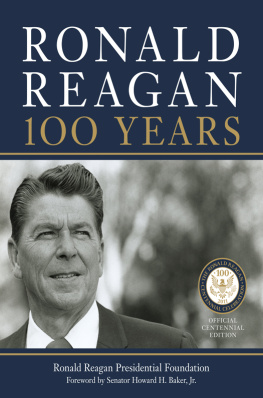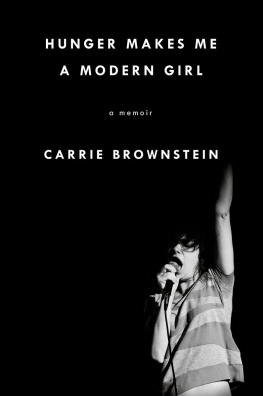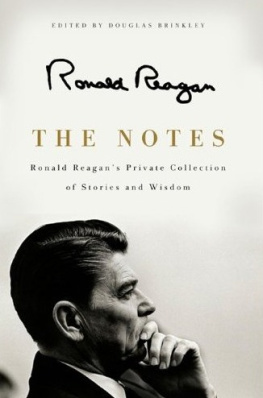Ronald Brownstein - Rock Me on the Water
Here you can read online Ronald Brownstein - Rock Me on the Water full text of the book (entire story) in english for free. Download pdf and epub, get meaning, cover and reviews about this ebook. year: 2021, publisher: Harper, genre: Non-fiction. Description of the work, (preface) as well as reviews are available. Best literature library LitArk.com created for fans of good reading and offers a wide selection of genres:
Romance novel
Science fiction
Adventure
Detective
Science
History
Home and family
Prose
Art
Politics
Computer
Non-fiction
Religion
Business
Children
Humor
Choose a favorite category and find really read worthwhile books. Enjoy immersion in the world of imagination, feel the emotions of the characters or learn something new for yourself, make an fascinating discovery.
- Book:Rock Me on the Water
- Author:
- Publisher:Harper
- Genre:
- Year:2021
- Rating:5 / 5
- Favourites:Add to favourites
- Your mark:
- 100
- 1
- 2
- 3
- 4
- 5
Rock Me on the Water: summary, description and annotation
We offer to read an annotation, description, summary or preface (depends on what the author of the book "Rock Me on the Water" wrote himself). If you haven't found the necessary information about the book — write in the comments, we will try to find it.
Rock Me on the Water — read online for free the complete book (whole text) full work
Below is the text of the book, divided by pages. System saving the place of the last page read, allows you to conveniently read the book "Rock Me on the Water" online for free, without having to search again every time where you left off. Put a bookmark, and you can go to the page where you finished reading at any time.
Font size:
Interval:
Bookmark:
For Eileen, my LA woman
On the evening of February 21, 1974, Mo Ostin led David Geffen to the Beverly Wilshire hotel in Beverly Hills for what Geffen was told would be a business meeting with Barbra Streisand.
Dignified and reserved, Ostin had been in the music business a long time. He had started as Frank Sinatras accountant and then ascended to become the head of the Warner Bros. music operation after the studio acquired Reprise, Sinatras record label, in 1963. Geffen, the president of Warners Elektra/Asylum label, was Ostins opposite in every way: young, endlessly ambitious, brilliant, relentless, and volcanic.
Behind the doors of the Beverly Wilshires Le Grand Trianon ballroom, an array of stars waited for the two men. Bob Dylan was there with the Band; as were Cher, Ringo Starr, Harry Nilsson, Warren Beatty, Jack Nicholson, and Bianca Jagger. So were record moguls (the elegant Ahmet Ertegun of Atlantic Records, a Geffen mentor who had flown out from New York City; Joe Smith of Warner Bros.; rival Artie Mogull of MCA), agents (Jeff Wald), and producers (Bill Graham, who had worked with Geffen that winter to mount a hugely successful reunion tour for Dylan and the Band).
Balloons and streamers hung from the ceiling, and in a carnival theme, a fire-eater, knife thrower, cyclist, fortune-teller, and two mimes were scattered through the room. Only a few years earlier, Geffen had been laboring in the mail room at the William Morris Agency, arriving early every morning to intercept a letter from UCLA informing his employers that he had not, in fact, graduated from the school, as he had told them. Now the A-list celebrities who had patiently gathered in the posh ballroom measured how quickly Geffen, still only thirty-one, had scaled the entertainment industrys highest peaks. The point was underscored when Dylan, the Band, and Cher (improbably, Geffens girlfriend at the time) serenaded the crowd with a twenty-minute mini-concert. Bob Dylan didnt play many private parties.
It was a triumphant moment for Geffen, but the party could just as easily have been a celebration of the stars and moguls who mingled around him. They, too, stood at a pinnacle. Los Angeles in 1974 exerted more influence over popular culture than any other city in America. That year, in fact, the city dominated popular culture more than it ever had before, or would again. In movies, music, and television, the early 1970s marked a creative summit in LA that transformed each of those industries. The New Wave that revitalized Hollywood, the smooth Southern California sound that ruled the album charts and radio airwaves, the torrent of groundbreaking comedies that brought new sophistication and provocation to televisions prime timeall these emerged from Los Angeles. Working just blocks from one another in film, recording, and television studios around Sunset Boulevard, living in Brentwood and Beverly Hills or amid the flickering lights of the Hollywood Hills, a cluster of transformative talents produced a sustained burst of pop culture mastery and innovation. There was a tremendous feeling of anything [is possible], musician Graham Nash remembered. What do you want to think of? We can do anything. What do you want? What do you want to do? Where do you want to go? What do you want to play? What album do you want to make? There was no end to [it]. We were in this pool of, like, magic stuff, and it was rubbing off on everybody.
Those producing some of their careers greatest work in Los Angeles at this time included Robert Altman, Warren Beatty, Peter Bogdanovich, Francis Ford Coppola, George Lucas, Jack Nicholson, Gordon Parks, Arthur Penn, Roman Polanski, Martin Scorsese, Steven Spielberg, and Robert Towne in film; Crosby, Stills, Nash and Young, Jackson Browne, the Eagles, Carole King, Joni Mitchell, Linda Ronstadt, James Taylor, and Bill Withers in music; and Alan Alda, James L. Brooks, Allan Burns, Larry Gelbart, Norman Lear, Mary Tyler Moore, Carroll OConnor, Rob Reiner, and Gene Reynolds in television. Behind them were legendary executives, agents, and managers, including Lou Adler, Clarence Avant, David Geffen, Berry Gordy, and Mo Ostin in the music industry; and in film and television, Barry Diller and Michael Eisner (first at ABC and then at Paramount), Robert Evans (of Paramount), and Robert Wood (of CBS). I dont know what was in the air or in the water, but everything from Malibu to Hollywood was magical, said Irving Azoff, who rode the Southern California wave to fame and riches as the combative manager of the Eagles. The restaurants were magical, the clubs were magical, the people.
Los Angeles has had other great periods in film (the years around World War II), television (the golden age of the 1950s and the peak TV era that has gathered momentum through the twenty-first century), and music (the hip-hop revolution of the later 1980s and 90s). Yet, the early 1970s was the moment when all three of these industries simultaneously reached a creative peakand 1974 stood as the absolute pinnacle of this cultural renaissance. For Los Angeles, those twelve glittering months represented magic hour.
In film, 1974 saw the release of Chinatown, The Godfather Part II, The Conversation, and the great Vietnam documentary Hearts and Minds; the filming of Nashville, Jaws, and Shampoo; and the completion of the first-draft screenplay for a space adventure called Star Wars. In television, the year brought together the transformative comedies All in the Family, M*A*S*H, and Mary Tyler Moore (along with the Bob Newhart and Carol Burnett shows) on a CBS Saturday schedule that has been called the greatest night in television history. That year, Joni Mitchell, the Eagles, Jackson Browne, and Linda Ronstadt all issued career-redefining albums on Geffens label, and Bob Dylan and the Band and Crosby, Stills, Nash and Young mounted record-setting concert tours with him. A fresh breeze blew through even the states politics that year, when California elected Edmund Gerald Jerry Brown Jr. as its youngest governor in decades.
The great art produced in early 1970s Los Angeles was socially engaged, grappling with all the changes and critiques of American life that had rumbled through society during the 1960s: greater suspicion of authority in business and government, more assertive roles for women, more tolerance of premarital sex, greater acceptance of racial and sexual minorities. All these are now dominant (if still not uniform) attitudes in America, but they were not widely accepted before they were infused into the movies, television, and music emerging in this period in Los Angeles. Popular culture became the bridge between the mass American audience and once-insurrectionary ideas that developed on the vanguard of the social and political movements of the 1960s. That bridge has proven unshakeable over the past half century. Even at their moments of maximum electoral influence (the presidencies of Ronald Reagan and George W. Bush and the first years of Donald Trumps turbulent reign), conservatives often lament that they have won the political battle but lost the culture. In the struggle for control of popular culture, Los Angeles during the early 1970s was the rights Gettysburg or Battle of the Bulge: the moment when it definitively lost the war.
Very few would have predicted this outcome just a few years earlier. Even into the late 1960s, none of the entertainment industries reflected the social changes coursing around them. Hollywood, at a low ebb financially and artistically, was dominated by bloated historical epics and musicals; television, operating under the theory of what one top executive labeled the least objectionable program, narcotized American households with a deadening array of rural comedies; and while rock music ruled the AM airwaves, the record labels had not yet accepted the idea of the album as a coherent artistic and social statement. Within a few years, all this had changed, and the artists based in Los Angeles functioned as the fulcrum of the shift. By the early 1970s, the music, movies, and television emanating from Los Angeles all reflected the demographic, social, and cultural realities of a changing America much more than the nations politics did. At a time when Richard Nixon won two presidential elections with a message of backlash against the social changes unleashed by the sixties, popular culture was ahead of politics in predicting what America would become.
Font size:
Interval:
Bookmark:
Similar books «Rock Me on the Water»
Look at similar books to Rock Me on the Water. We have selected literature similar in name and meaning in the hope of providing readers with more options to find new, interesting, not yet read works.
Discussion, reviews of the book Rock Me on the Water and just readers' own opinions. Leave your comments, write what you think about the work, its meaning or the main characters. Specify what exactly you liked and what you didn't like, and why you think so.

